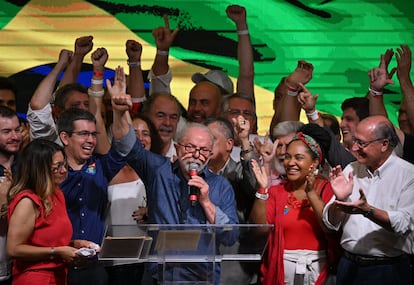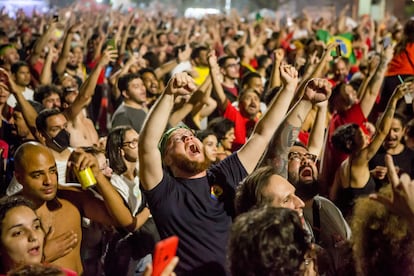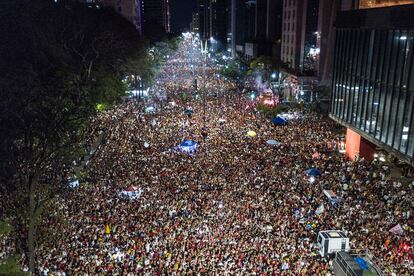Lula defeats Bolsonaro in the closest election in Brazil’s history
Lula da Silva, the leftist former president, will govern Brazil for the third time after securing just under 51% of the vote


Luiz Inácio Lula da Silva – popularly known as “Lula” – won Brazil’s runoff election on Sunday, October 30, denying far-right President Jair Bolsonaro a second term.
Lula made history in many ways. No Brazilian presidential candidate has ever won so many votes – nearly 61 million – or defeated his opponent by such a tiny margin (less than 2%). The 77-year-old leader of the Workers’ Party (PT) – who governed Brazil from 2003 until 2011 – returns to power just three years after he spent 580 days behind bars for corruption charges. He will now become the oldest president in Brazilian history.
With 99.7% of the votes counted, Lula stood at 50.89%, with 67-year-old Bolsonaro close behind at 49.11%. The Brazilian left will return to power six years after their last president – Dilma Rousseff – was impeached. The victory is even more symbolic considering the man they defeated: a former soldier, nostalgic for Brazil’s military dictatorship (1964-85), who spent the last four years in a war with the country’s institutions.
Brazilians were forced to choose between two well-known candidates after the dirtiest electoral campaign in modern history. For Lula, the election was between “democracy and barbarity” – for Bolsonaro, it was a duel between “good and evil.” Lies, physical assaults and digital harassment plagued the entire race. Thankfully, as Brazil has been using a refined electronic voting system for more than 25 years, the results were quick to come out.
Lula – perhaps the most respected figure from Latin America’s democratic left – returns to office at a time when the entire region is tilting to the left. For the first time ever, the five biggest economies in Latin America – Brazil, Mexico, Argentina, Colombia, and Chile – are governed by leftists.
The first big foreign policy dilemma that Lula will confront will be regarding the position that Brazil takes on the war in Ukraine. Bolsonaro has been a strong supporter of Putin – but Lula also had a good relationship with the Russian dictator during his tenure. He will also have to strategically place Brazil – Latin America’s economic powerhouse – beyond the escalating dispute between China and the United States.
In his victory speech – conscious of his narrow margin of victory – Lula took a conciliatory tone. From a hotel in São Paulo, he vowed to govern for “all 215 million Brazilians.”
“There are not two Brazils: there is only one country, one people, one great nation,” he proclaimed. He did, however, take a jab at his political opponents, who celebrated in 2018 when he was imprisoned for corruption – a sentence that was eventually overturned by the Supreme Court: “I’m a citizen who has lived through a process of resurrection. They tried to bury me alive… but here I am!”
Lula claimed that his return marks a revitalization of Brazilian democracy, following Bolsonaro’s authoritarian leanings. “This wasn’t my victory, or a victory for the Workers’ Party or the other parties that have supported me… this is a victory for a mass democratic movement that is bigger than parties and personal interests.”

As demonstrated by the final result, Brazil is more polarized than ever. Lula will have to tread carefully, especially as the legislative branch – the Chamber of Deputies and the Senate – are both controlled by conservative political blocs. Bolsonaro’s ally, Tarcisio de Freitas, has won the gubernatorial election in São Paulo, Brazil’s richest and most-populous state. On top of this division, more than 33 million Brazilians are experiencing hunger or food insecurity as the country’s stagnant economy suffers from rising unemployment, declining wages and creeping inflation.
Lula will take office two months from now, on New Year’s Day. In the meantime, he’ll have to name a cabinet from the 10 parties in his coalition – which range from the far-left to the center-right – and find a way to create a functioning majority in the National Parliament. It is expected that the former president, renowned for his negotiating skills, will put governance before party loyalty.
Lula won his election in a highly cynical political environment. Many Brazilians have not forgiven him for the corruption allegations that plagued his two previous administrations. Bolsonaro spent most of the campaign saying that Lula would turn the country “into another Venezuela,” while handing out cash transfers to the poor in hopes of buying his re-election. His plan didn’t work out, but the country’s finances are now in a bad state, as is the Amazon rainforest and the country’s health infrastructure. Lula – who has not presented a specific program of action – will need to carefully balance fiscal discipline with support for the most vulnerable. Who he names as Minister of Economy will be a sign of things to come.
Many Brazilian cities offered free public transportation to help people get to the polls – something that benefited lower-income citizens, most of whom voted for Lula. However, an increase in police traffic checkpoints in the Northeast Region – Lula’s stronghold – delayed commutes to polling stations, leading to an outcry. In the end, the electoral authorities ruled that this did not affect the democratic process.
There is now enormous doubt over whether or not the incumbent president will even accept his defeat. Some fear that, in the style of Donald Trump – who enthusiastically endorsed Bolsonaro – he will attempt to overturn the results. For this reason, the electoral authorities have invited foreign ambassadors to view the recount at the Superior Electoral Court in Brasília, the federal capital of Brazil.

According to surveys, about 94% of voters had already decided who they were going to vote for as of several weeks ago. In the end, a few million undecided citizens held their nose and voted for Lula, not because they supported him, but because they couldn’t bear the thought of four more years of Bolsonaro’s chaos. Both candidates saw their popularity decline massively over the past months, thanks to both campaign teams waging unchecked wars on social media that demonized the other side. At various times in October, Lula and Bolsonaro were derided as cannibals, satanists or pedophiles by fake news posts and videos.
Lula’s narrow victory in the second round comes four weeks after he barely won the first. While many polls showed him winning outright on October 2, Bolsonaro caught up to him: the final result was 48% for Lula and 43% for Bolsonaro. This required the Workers’ Party leader to reach out to centrist Senator Simone Tebet and center-left former minister Ciro Gomes, the third and fourth-place finishers respectively. Both endorsed him over Bolsonaro and urged their supporters to give him their vote in the runoff election. Meanwhile, Bolsonaro was left to rely on the right-wing governors of São Paulo, Río de Janeiro and Minas Gerais to boost his voter turnout ever further.
The 2022 campaign offered Brazilians few policy specifics. Lula based his campaign on vague concepts like unity, while harkening back to the glory days of his past administrations. Bolsonaro, meanwhile, played the fear game. Neither man explicitly said what they would do with the crucial monthly transfer payments of 600 reais – about $114 – that 20 million of the poorest Brazilians rely on, nor what action they would take to reactivate the economy as a global recession looms.
Lula – who, in 2003, became the first working-class person to have ever governed the country – has vowed to protect the environment, grow the economy, bolster public healthcare and education, crack down on corruption, safeguard democracy and take care of the most vulnerable Brazilians. A long list of promises, indeed. The president-elect will now have to answer how he plans on paying for all of it.
Tu suscripción se está usando en otro dispositivo
¿Quieres añadir otro usuario a tu suscripción?
Si continúas leyendo en este dispositivo, no se podrá leer en el otro.
FlechaTu suscripción se está usando en otro dispositivo y solo puedes acceder a EL PAÍS desde un dispositivo a la vez.
Si quieres compartir tu cuenta, cambia tu suscripción a la modalidad Premium, así podrás añadir otro usuario. Cada uno accederá con su propia cuenta de email, lo que os permitirá personalizar vuestra experiencia en EL PAÍS.
¿Tienes una suscripción de empresa? Accede aquí para contratar más cuentas.
En el caso de no saber quién está usando tu cuenta, te recomendamos cambiar tu contraseña aquí.
Si decides continuar compartiendo tu cuenta, este mensaje se mostrará en tu dispositivo y en el de la otra persona que está usando tu cuenta de forma indefinida, afectando a tu experiencia de lectura. Puedes consultar aquí los términos y condiciones de la suscripción digital.








































